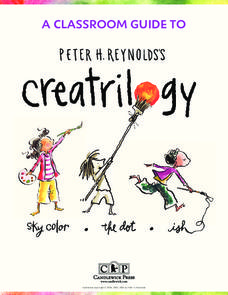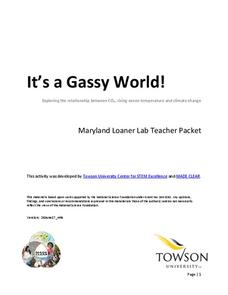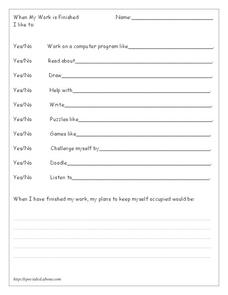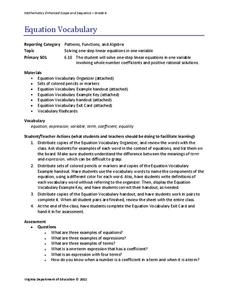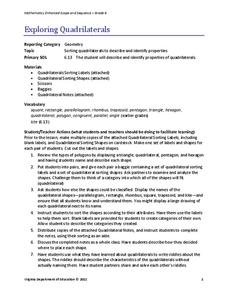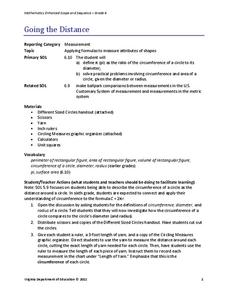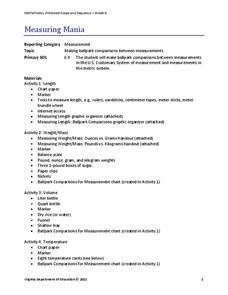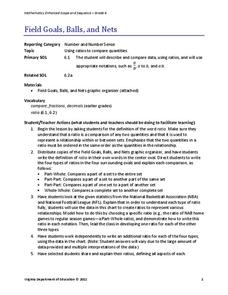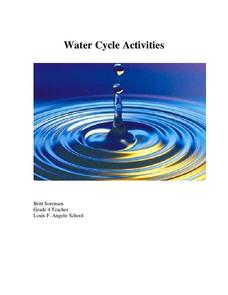Scholastic
Organization Outline
Forming a strong organizational outline is important when reading a complex text, writing an informative essay, or analyzing a complicated problem. Use a straightforward organization outline to teach learners about concept mapping.
Candlewick Press
A Classroom Guide to Peter H. Reynolds's Creatrilogy
Help young readers find, identify, and use their voices with a set of empowering activities based on Peter H. Reynolds' trilogy of books. Sky Color, Ish, and The Dot focus on recognizing moods and treating each other kindly, and their...
Mr. Nussbaum
THE Founding Father
Who is the founding father—George Washington, Thomas Jefferson, or Benjamin Franklin? Scholars decide which of three early Americans, should be crowned the founding father of America based on research. Then, they compose a persuasive...
Teach Beside Me
Benjamin Franklin Lesson Ideas
Bring Benjamin Franklin to life in the classroom with a set of five activities. Discover the type of person he was and his accomplishments through a study of his inventions and comments about life virtues.
Library of Virginia
You are Clever Enough to Examine a Historical Source!
Your students are obviously clever, but now they can be C-L-E-V-E-R! Enhance a research project with an exercise that prompts learners to identify the creator, location, era, and value of the information source, as well as provide an...
Curriculum Corner
Winter Multiplication and Division Problem Solving Task Cards
A set of 18 winter-themed multiplication and division word problems is perfect for your math centers right before the holidays. Each problem is numbered and represented on a task card. Young mathematicians write their answers on a...
Curriculum Corner
Coniferous and Deciduous Trees
What are the differences between coniferous and deciduous trees? Supplement your tree lessons with a set of activities that has learners describing, naming, comparing, and reading about deciduous and coniferous trees. The activities are...
Towson University
Looking Backwards, Looking Forward
How do scientists know what Earth's climate was like millions of years ago? Young environmental scholars discover how researchers used proxy data to determine the conditions present before written record. Grouped pupils gain experience...
Towson University
It's a Gassy World!
How much does your class know about the relationship between climate change and carbon dioxide? Science scholars explore the nature of greenhouse gases and rising ocean temperature through demonstrations, research, and experiments. The...
ThoughtCo
Back to School Means...(Concept Web)
Going back to school doesn't have to be scary! Brainstorm what Back to School means with a concept web graphic organizer.
ThoughtCo
When My Work is Finished
The most chaotic time in the classroom can be when some people are finished with their work, but others aren't. A checklist and reflection worksheet reminds learners what their options are after finishing their work, including reading,...
ThoughtCo
Compare and Contrast
How was your summer vacation? Encourage class members to meet their new friends with a back-to-school activity that compares summer vacations using a Venn diagram.
George W. Bush Presidential Library and Museum
Teaching Primary and Secondary Sources
What makes a source primary or secondary? Middle schoolers read a definition of each term before exploring different examples and applying their knowledge to a research project.
American Physiological Society
Why is Kettle Corn Cooked in Copper Pots?
The kitchen — it's not just for eating anymore! Specific heat is often a difficult concept to grasp, so give it context by relating it to cooking. Learners gain experience in the principles of thermal energy transfer by designing an...
American Physiological Society
What Environmental Conditions Lead to the Hatching of Brine Shrimp?
Will changing the environment in which brine shrimp live impact their reproductive success? Young scientists get hands-on experience studying the habitat of brine shrimp in a two-week immersion lesson. The teacher's guide provides all of...
American Physiological Society
Did I Observe it or Infer it?
Take the mystery out of inquiry! When young scientists learn to use their keen powers of observation to make smart inferences about a situation, they are well on their way to understanding what the scientific method is all about. Using...
Virginia Department of Education
Equation Vocabulary
You'd feel bad if someone called you by the wrong name — and equations are no different. Young mathematicians learn the vocabulary associated with equations and expressions identifying these components in sample equations.
Virginia Department of Education
Exploring Quadrilaterals
Sort this resource into the Use pile. Scholars investigate attributes of quadrilaterals and then use the results to sort and classify the shapes labeling each figure with their properties to justify the classifications.
Virginia Department of Education
Out of the Box
There's no need to think outside the box for this one! Scholars measure the length, width, and height of various boxes. Results help develop the formulas for the surface area and volume of rectangular prisms.
Virginia Department of Education
Going the Distance
Estimate the value of one of the most famous irrational numbers. The hands-on lesson plan instructs classmates to measure the circumference and diameters of circles using yarn. The ratio of these quantities defines pi.
Virginia Department of Education
Measuring Mania
Conversion immersion — it's measuring mania! A set of four activities teaches scholars to convert between customary and metric units. Resource covers unit conversions in length, temperature, weight/mass, and volume.
Virginia Department of Education
Field Goals, Balls, and Nets
Score a resource on ratios. Young mathematicians learn about different ways to express ratios. Using sports data, they write statements about the statistics in ratio form.
Curriculum Corner
Root Words
Ten pages offer useful information and five activities designed to reinforce the concept of root words. Scholars make a root word booklet, partake in a matching activity that challenges them to match root words to their meaning, record...
Curated OER
Water Cycle Activities
Explore the water cycle in all aspects with a resource packed full of activities and lessons. The 37-page packet comes with vocabulary, a game, writing prompts, printables, and opportunities to journey through the stages in the water...



